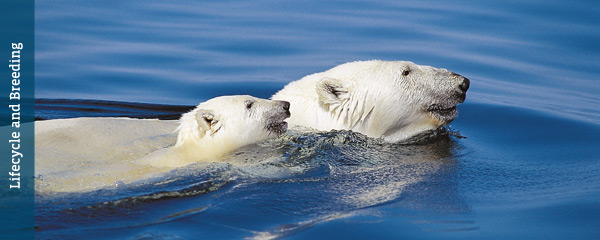Myth: A polar bear covers its nose with a paw when hunting.
Fact: This myth seems to stem from accounts by early Arctic explorers, and native oral history. Scientists surveyed undisturbed polar bears hunting seal in the Canadian Arctic over a period of years, and no bear was ever seen covering its nose with a paw. From a practicality standpoint, stalking 50-200 metres across the ice on 3 paws would be extremely difficult.
Myth: All polar bears are ‘left pawed’.
Fact: There is no evidence to support the claim that all polar bears are ‘left pawed’. Polar bears seem to be ambidextrous.
Myth: Polar bears use tools to kill their prey.
Fact: Polar bears do not appear to use tools in any capacity to capture or kill their prey. After failing to catch a seal, the bear may kick the snow or hurl a chunk of ice, which may be the basis for this myth.
Myth: A polar bear’s fur conducts UV light.
Fact: It was thought that the hollow, transparent hairs of a polar bear’s fur could conduct UV light to its black skin. This theory was tested by a physicist, and disproven.
Myth: Polar bears have a mutualistic relationship with Arctic foxes.
Fact: There is a myth that polar bears share food with Arctic foxes in exchange for the use of the foxes’ warning system. Arctic foxes do trail behind polar bears, scavenging the remains of their prey, but polar bears often become irritated with the foxes and will slap them away. In the spring bears and foxes are competitors, hunting ringed seal pups.
Myth: Orcas will attack a polar bear in open water.
Fact: There have been no documented attacks by orcas on a polar bear in open water, or stranded on a sea ice remnant. However, as Arctic ice recedes and orca territory proceeds, future attacks are entirely possible.
Myth: Polar bears coexist alongside penguins.
Fact: Illustrations often show polar bears and penguins side by side, but this would never happen in the wild. Polar bears live exclusively in the northern hemisphere, while penguins only live as far north as the equator. The arctic was named from the Greek word for bear, ‘άρκτος’ (ARK-tos); so in turn ‘Antarctica’ comes from the Greek meaning ‘opposite of the Arctic’ or ‘opposite the bear’.







